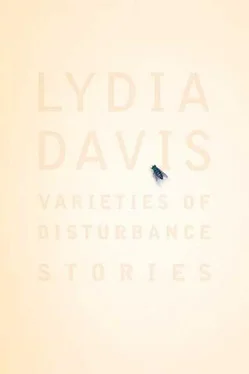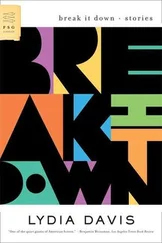Shall I come out in the morning neatly dressed with my bed made, like R.?
Shall I have my first cup of coffee at eleven o’clock, like R.?
Shall I lay out the forks in a fan, and the napkins in a row, for company, like L.?
Shall I make pancakes in the morning when traveling, like C.?
Shall I carry liquor in the trunk of my car when on holiday, like C.?
Shall I make an oyster stew on New Year’s Eve that is full of sand, like C.?
Shall I hand a knife carefully to another person handle first, like R.?
Shall I speak against my husband to the grocer, like C.?
Shall I always read with a pencil in my hand, like R.?
Shall I hug my bereaved children too long and too often, like C.?
Shall I ignore health warnings, like B.?
Shall I give gifts of money freely, like C.?
Shall I give gifts with animal themes, like C.?
Shall I keep a small plastic seal in my refrigerator, like C.?
Shall I have trouble sleeping on my arm, like R.?
Shall I take off my shirt just before I die, like B.?
Shall I wear only black and white, like M.?
I looked down on the street from my window. The sun shone and the shopkeepers had come out to stand in the warmth and watch the people go by. But why were the shopkeepers covering their ears? And why were the people in the street running as if pursued by a terrible specter? Soon everything returned to normal: the incident had been no more than a moment of madness during which the people could not bear the frustration of their lives and had given way to a strange impulse.
She could not drive if there were too many clouds in the sky. Or rather, if she could drive with many clouds in the sky, she could not have music playing if there were also passengers in the car. If there were two passengers, as well as a small caged animal, and many clouds in the sky, she could listen but not speak. If a wind blew shavings from the small animal’s cage over her shoulder and lap as well as the shoulder and lap of the man next to her, she could not speak to anyone or listen, even if there were very few clouds in the sky. If the small boy was quiet, reading his book in the back seat, but the man next to her opened his newspaper so wide that its edge touched the gearshift and the sunlight shone off its white page into her eyes, then she could not speak or listen while trying to enter a large highway full of fast-moving cars, even if there were no clouds in the sky.
Then, if it was night and the boy was not in the car, and the small caged animal was not in the car, and the car was empty of boxes and suitcases where before it had been full, and the man next to her was not reading a newspaper but looking out the window straight ahead, and the sky was dark so that she could see no clouds, she could listen but not talk, and she could have no music playing, if a motel brightly illuminated above her on a dark hill some distance ahead and to the left seemed to be floating across the highway in front as she drove at high speed between dotted lines with headlights coming at her on the left and up behind her in the rearview mirror and taillights ahead in a gentle curve around to the right underneath the massive airship of motel lights floating across the highway from left to right in front of her, or could talk, but only to say one thing, which went unanswered.
because she couldn’t write the name of what she was: a wa wam owm owamn womn
I slapped him again because when I was carrying him in my arms he tore my glasses off and hurled them at the grate in the hall. But he wouldn’t have done it if I hadn’t been so angry already. After that I put him to bed.
Downstairs, I sat on the sofa eating and reading a magazine. I fell asleep there for an hour. I woke up with crumbs on my chest. When I went into the bathroom, I could not look at myself in the mirror. I did the dishes and sat down again in the living room. Before I went to bed I told myself things were getting better. It was true: this day had been better than the day before, and the day before had been better than most of last week, though not much better.
Heart weeps.
Head tries to help heart.
Head tells heart how it is, again:
You will lose the ones you love. They will all go. But even the earth will go, someday.
Heart feels better, then.
But the words of head do not remain long in the ears of heart.
Heart is so new to this.
I want them back, says heart.
Head is all heart has.
Help, head. Help heart.
My grandmother and I live among strangers. The house does not seem big enough to hold all the people who keep appearing in it at different times. They sit down to dinner as though they had been expected — and indeed there is always a place laid for them — or come into the drawing room out of the cold, rubbing their hands and exclaiming over the weather, settle by the fire and take up a book I had not noticed before, continuing to read from a place they had marked with a worn paper bookmark. As would be quite natural, some of them are bright and agreeable, while others are unpleasant — peevish or sly. I form immediate friendships with some — we understand each other perfectly from the moment we meet — and look forward to seeing them again at breakfast. But when I go down to breakfast they are not there; often I never see them again. All this is very unsettling. My grandmother and I never mention this coming and going of strangers in the house. But I watch her delicate pink face as she enters the dining room leaning on her cane and stops in surprise — she moves so slowly that this is barely perceptible. A young man rises from his place, clutching his napkin at his belt, and goes to help her into her chair. She adjusts to his presence with a nervous smile and a gracious nod, though I know she is as dismayed as I am that he was not here this morning and will not be here tomorrow and yet behaves as though this were all very natural. But often enough, of course, the person at the table is not a polite young man but a thin spinster who eats silently and quickly and leaves before we are done, or an old woman who scowls at the rest of us and spits the skin of her baked apple onto the edge of her plate. There is nothing we can do about this. How can we get rid of people we never invited who leave of their own accord anyway, sooner or later? Though we are of different generations, we were both brought up never to ask questions and only to smile at things we did not understand.
I am so used to it by now
that when the traffic falls silent,
I think a storm is coming.
All day long the old woman struggles with her house and the objects in it: the doors will not shut; the floorboards separate and the clay squeezes up between them; the plaster walls dampen with rain; bats fly down from the attic and invade her wardrobe; mice make nests in her shoes; her fragile dresses fall into tatters from their own weight on the hanger; she finds dead insects everywhere. In desperation she exhausts herself sweeping, dusting, mending, caulking, gluing, and at night sinks into bed holding her hands over her ears so as not to hear the house continue to subside into ruin around her.
At the back of the bus,
inside the bathroom,
this very small illegal passenger,
on its way to Boston.
1.
The bus said “Buffalo” on the front, after all, not “Cleveland.” The backpack was from the Sierra Club, not the Audubon Society.
Читать дальше












